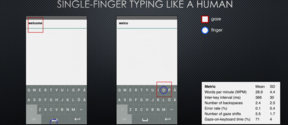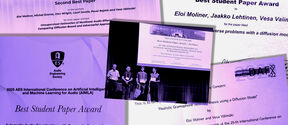Teaching a computer to type like a human

An entirely new predictive typing model can simulate different kinds of users, helping figure out ways to optimize how we use our phones. Developed by researchers at Aalto University, the new model captures the difference between typing with one or two hands or between younger and older users.
‘Typing on a phone requires manual dexterity and visual perception: we press buttons, proofread text, and correct mistakes. We also use our working memory. Automatic text correction functions can help some people, while for others they can make typing harder,’ says Professor Antti Oulasvirta of Aalto University.
The researchers created a machine-learning model that uses its virtual ‘eyes and fingers’ and working memory to type out a sentence, just like humans do. That means it also makes similar mistakes and has to correct them.
‘We created a simulated user with a human-like visual and motor system. Then we trained it millions of times in a keyboard simulator. Eventually, it learned typing skills that can also be used to type in various situations outside the simulator,’ explains Oulasvirta.
The predictive typing model was developed in collaboration with Google. New designs for phone keyboards are normally tested with real users, which is costly and time-consuming. The project’s goal is to complement those tests so keyboards can be evaluated and optimized more quickly and easily.
For Oulasvirta, this is part of a larger effort to improve user interfaces overall and understand how humans behave in task-oriented situations. He leads a research group at Aalto that uses computational models of human behaviour to probe these questions.
‘We can train computer models so that we don’t need observation of lots of people to make predictions. User interfaces are everywhere today – fundamentally, this work aims to create a more functional society and smoother everyday life,’ he says.
The researchers will present their findings at the CHI Conference in May, the most prestigious scientific publication forum in the field of human-computer interaction. The peer-reviewed study is already available online.
This news item was originally published on the Aalto University website on 18.4.2024
Read more news
A survey on users' experiences of Mykanta in collaboration between Aalto University and Kela
Senior university lecturer Sari Kujala's research group is exploring, in collaboration with Kela, users' experiences with the Mykanta online patient portal and the MyKanta mobile application.
Specialised AI models could be Finland's next global export
Finland has the potential to build AI solutions that are different from ChatGPT-like large language models. Aalto University's School of Electrical Engineering already has decades of experience in developing specialised, resource-efficient AI models. They could be a key component of future 6G networks, automation, and industrial systems – and the next competitive edge of our country.
Professor Patric Östergård becomes a member of the Finnish Society of Sciences and Letters
Finnish Society of Sciences and Letters is Finland's oldest science academy. It promotes scientific discussion, publishes scientific literature, awards prizes and provides financial support for research.